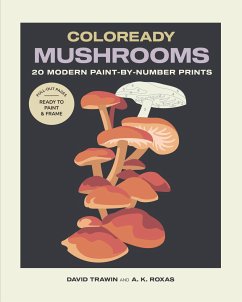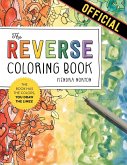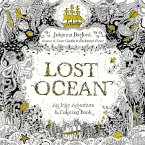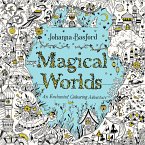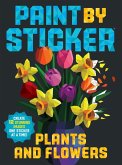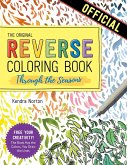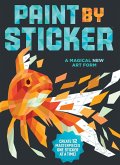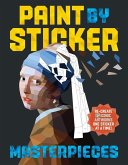16,99 €
inkl. MwSt.
Sofort lieferbar

8 °P sammeln
- Broschiertes Buch
- Merkliste
- Auf die Merkliste
- Bewerten Bewerten
- Teilen
- Produkt teilen
- Produkterinnerung
- Produkterinnerung
Paint by number has been updated with a hip, contemporary look in this collection of 20 images of mushrooms, printed on premium art paper, perfect for framing and DIY home dà cor.
Andere Kunden interessierten sich auch für
![The Reverse Coloring Book(TM) The Reverse Coloring Book(TM)]() Kendra NortonThe Reverse Coloring Book(TM)10,99 €
Kendra NortonThe Reverse Coloring Book(TM)10,99 €![Lost Ocean Lost Ocean]() Johanna BasfordLost Ocean10,99 €
Johanna BasfordLost Ocean10,99 €![Magical Worlds Magical Worlds]() Johanna BasfordMagical Worlds16,99 €
Johanna BasfordMagical Worlds16,99 €![Paint by Sticker: Plants and Flowers Paint by Sticker: Plants and Flowers]() Workman PublishingPaint by Sticker: Plants and Flowers12,99 €
Workman PublishingPaint by Sticker: Plants and Flowers12,99 €![The Reverse Coloring Book(TM): Through the Seasons The Reverse Coloring Book(TM): Through the Seasons]() Kendra NortonThe Reverse Coloring Book(TM): Through the Seasons10,99 €
Kendra NortonThe Reverse Coloring Book(TM): Through the Seasons10,99 €![Paint by Sticker Paint by Sticker]() Workman PublishingPaint by Sticker12,99 €
Workman PublishingPaint by Sticker12,99 €![Paint by Sticker: Masterpieces Paint by Sticker: Masterpieces]() Workman PublishingPaint by Sticker: Masterpieces12,99 €
Workman PublishingPaint by Sticker: Masterpieces12,99 €-
-
-
Paint by number has been updated with a hip, contemporary look in this collection of 20 images of mushrooms, printed on premium art paper, perfect for framing and DIY home dà cor.
Hinweis: Dieser Artikel kann nur an eine deutsche Lieferadresse ausgeliefert werden.
Hinweis: Dieser Artikel kann nur an eine deutsche Lieferadresse ausgeliefert werden.
Produktdetails
- Produktdetails
- Verlag: Workman Publishing
- Seitenzahl: 112
- Erscheinungstermin: 3. September 2024
- Englisch
- Abmessung: 252mm x 203mm x 16mm
- Gewicht: 626g
- ISBN-13: 9781635868753
- ISBN-10: 1635868750
- Artikelnr.: 69823527
- Herstellerkennzeichnung
- Libri GmbH
- Europaallee 1
- 36244 Bad Hersfeld
- gpsr@libri.de
- Verlag: Workman Publishing
- Seitenzahl: 112
- Erscheinungstermin: 3. September 2024
- Englisch
- Abmessung: 252mm x 203mm x 16mm
- Gewicht: 626g
- ISBN-13: 9781635868753
- ISBN-10: 1635868750
- Artikelnr.: 69823527
- Herstellerkennzeichnung
- Libri GmbH
- Europaallee 1
- 36244 Bad Hersfeld
- gpsr@libri.de
David Trawin is a graphic designer and the creative force behind Coloready, which offers a modern spin on the paint-by-number art kit. He lives in New Jersey with his wife and co-writer, A.K., and their two children.
Introduction // A brief history of paint-by-numbers
This style of creating art has a deeper past than you might imagine. We’ll
write a brief timeline of this art technique, spanning the Renaissance (Da
Vinci used this technique to teach his students) to its rediscovery by
artist Dan Robins, through the mass market fad from the 50s-70s into how it
fits in with today’s design savvy, DIY audience.
Subject// The Beauty of Mushrooms
We’ll highlight the mushrooms chosen for this book, talking about how we
focused as much on aesthetics as we did on the unique abilities and
quirkiness of each plant. We’ll highlight how visually beautiful they are,
and the mysterious appeal they carry for both the human and natural worlds.
Materials // We talk about the types of paints we’ll use and where to
source them (art store, Target, Amazon, Walmart, Blick), the types of
brushes you’ll want to use and the other basic materials you’ll need that
can be found around your home (water cups, scrap paper, paper towels, etc.
Alternate mediums will also be discussed and encouraged.
Techniques // There is no single “correct” way to paint. Some people prefer
clean crisp lines, some like more organic applications of color with looser
boundaries and some even prefer chaos and lean into bold abstraction. We’ll
address these techniques and how to achieve them including loading your
brush, brush handling, layering, watering down your paint, etc.
Satisfaction of your experience with paint-by-numbers art is largely based
on what your expectations are and how much you put into it.
Color Recipes // This will be a consolidated reference point for the entire
library of color we’ll use throughout the book. We’ll also discuss color
mixing techniques and how to check your colors to the suggested color
swatches.
Art Templates // (These are an example of the types of mushrooms we’re
thinking)
Mushroom 1 - Amanita muscaria (signature red cap with dotted white spots)
Mushroom 2 - Mycena chlorophos (a naturally luminescent species)
Mushroom 3 - Amethyst deceiver (purple and edible)
Mushroom 4 - Entoloma hochstetteri (bold blue)
Mushroom 5 - Clavaria zollingeri (magenta coral fungus)
…
- Mushroom 20
Finishing // How to frame your completed works of art.
Blank Pages // The final 2 pages of the book will have blank perforated
pages where you can tear a piece of paper off (about the size of a
band-aid) where you can paint your color mixture on the end and hold it
against the example swatch for color matching
This style of creating art has a deeper past than you might imagine. We’ll
write a brief timeline of this art technique, spanning the Renaissance (Da
Vinci used this technique to teach his students) to its rediscovery by
artist Dan Robins, through the mass market fad from the 50s-70s into how it
fits in with today’s design savvy, DIY audience.
Subject// The Beauty of Mushrooms
We’ll highlight the mushrooms chosen for this book, talking about how we
focused as much on aesthetics as we did on the unique abilities and
quirkiness of each plant. We’ll highlight how visually beautiful they are,
and the mysterious appeal they carry for both the human and natural worlds.
Materials // We talk about the types of paints we’ll use and where to
source them (art store, Target, Amazon, Walmart, Blick), the types of
brushes you’ll want to use and the other basic materials you’ll need that
can be found around your home (water cups, scrap paper, paper towels, etc.
Alternate mediums will also be discussed and encouraged.
Techniques // There is no single “correct” way to paint. Some people prefer
clean crisp lines, some like more organic applications of color with looser
boundaries and some even prefer chaos and lean into bold abstraction. We’ll
address these techniques and how to achieve them including loading your
brush, brush handling, layering, watering down your paint, etc.
Satisfaction of your experience with paint-by-numbers art is largely based
on what your expectations are and how much you put into it.
Color Recipes // This will be a consolidated reference point for the entire
library of color we’ll use throughout the book. We’ll also discuss color
mixing techniques and how to check your colors to the suggested color
swatches.
Art Templates // (These are an example of the types of mushrooms we’re
thinking)
Mushroom 1 - Amanita muscaria (signature red cap with dotted white spots)
Mushroom 2 - Mycena chlorophos (a naturally luminescent species)
Mushroom 3 - Amethyst deceiver (purple and edible)
Mushroom 4 - Entoloma hochstetteri (bold blue)
Mushroom 5 - Clavaria zollingeri (magenta coral fungus)
…
- Mushroom 20
Finishing // How to frame your completed works of art.
Blank Pages // The final 2 pages of the book will have blank perforated
pages where you can tear a piece of paper off (about the size of a
band-aid) where you can paint your color mixture on the end and hold it
against the example swatch for color matching
Introduction // A brief history of paint-by-numbers
This style of creating art has a deeper past than you might imagine. We’ll
write a brief timeline of this art technique, spanning the Renaissance (Da
Vinci used this technique to teach his students) to its rediscovery by
artist Dan Robins, through the mass market fad from the 50s-70s into how it
fits in with today’s design savvy, DIY audience.
Subject// The Beauty of Mushrooms
We’ll highlight the mushrooms chosen for this book, talking about how we
focused as much on aesthetics as we did on the unique abilities and
quirkiness of each plant. We’ll highlight how visually beautiful they are,
and the mysterious appeal they carry for both the human and natural worlds.
Materials // We talk about the types of paints we’ll use and where to
source them (art store, Target, Amazon, Walmart, Blick), the types of
brushes you’ll want to use and the other basic materials you’ll need that
can be found around your home (water cups, scrap paper, paper towels, etc.
Alternate mediums will also be discussed and encouraged.
Techniques // There is no single “correct” way to paint. Some people prefer
clean crisp lines, some like more organic applications of color with looser
boundaries and some even prefer chaos and lean into bold abstraction. We’ll
address these techniques and how to achieve them including loading your
brush, brush handling, layering, watering down your paint, etc.
Satisfaction of your experience with paint-by-numbers art is largely based
on what your expectations are and how much you put into it.
Color Recipes // This will be a consolidated reference point for the entire
library of color we’ll use throughout the book. We’ll also discuss color
mixing techniques and how to check your colors to the suggested color
swatches.
Art Templates // (These are an example of the types of mushrooms we’re
thinking)
Mushroom 1 - Amanita muscaria (signature red cap with dotted white spots)
Mushroom 2 - Mycena chlorophos (a naturally luminescent species)
Mushroom 3 - Amethyst deceiver (purple and edible)
Mushroom 4 - Entoloma hochstetteri (bold blue)
Mushroom 5 - Clavaria zollingeri (magenta coral fungus)
…
- Mushroom 20
Finishing // How to frame your completed works of art.
Blank Pages // The final 2 pages of the book will have blank perforated
pages where you can tear a piece of paper off (about the size of a
band-aid) where you can paint your color mixture on the end and hold it
against the example swatch for color matching
This style of creating art has a deeper past than you might imagine. We’ll
write a brief timeline of this art technique, spanning the Renaissance (Da
Vinci used this technique to teach his students) to its rediscovery by
artist Dan Robins, through the mass market fad from the 50s-70s into how it
fits in with today’s design savvy, DIY audience.
Subject// The Beauty of Mushrooms
We’ll highlight the mushrooms chosen for this book, talking about how we
focused as much on aesthetics as we did on the unique abilities and
quirkiness of each plant. We’ll highlight how visually beautiful they are,
and the mysterious appeal they carry for both the human and natural worlds.
Materials // We talk about the types of paints we’ll use and where to
source them (art store, Target, Amazon, Walmart, Blick), the types of
brushes you’ll want to use and the other basic materials you’ll need that
can be found around your home (water cups, scrap paper, paper towels, etc.
Alternate mediums will also be discussed and encouraged.
Techniques // There is no single “correct” way to paint. Some people prefer
clean crisp lines, some like more organic applications of color with looser
boundaries and some even prefer chaos and lean into bold abstraction. We’ll
address these techniques and how to achieve them including loading your
brush, brush handling, layering, watering down your paint, etc.
Satisfaction of your experience with paint-by-numbers art is largely based
on what your expectations are and how much you put into it.
Color Recipes // This will be a consolidated reference point for the entire
library of color we’ll use throughout the book. We’ll also discuss color
mixing techniques and how to check your colors to the suggested color
swatches.
Art Templates // (These are an example of the types of mushrooms we’re
thinking)
Mushroom 1 - Amanita muscaria (signature red cap with dotted white spots)
Mushroom 2 - Mycena chlorophos (a naturally luminescent species)
Mushroom 3 - Amethyst deceiver (purple and edible)
Mushroom 4 - Entoloma hochstetteri (bold blue)
Mushroom 5 - Clavaria zollingeri (magenta coral fungus)
…
- Mushroom 20
Finishing // How to frame your completed works of art.
Blank Pages // The final 2 pages of the book will have blank perforated
pages where you can tear a piece of paper off (about the size of a
band-aid) where you can paint your color mixture on the end and hold it
against the example swatch for color matching
